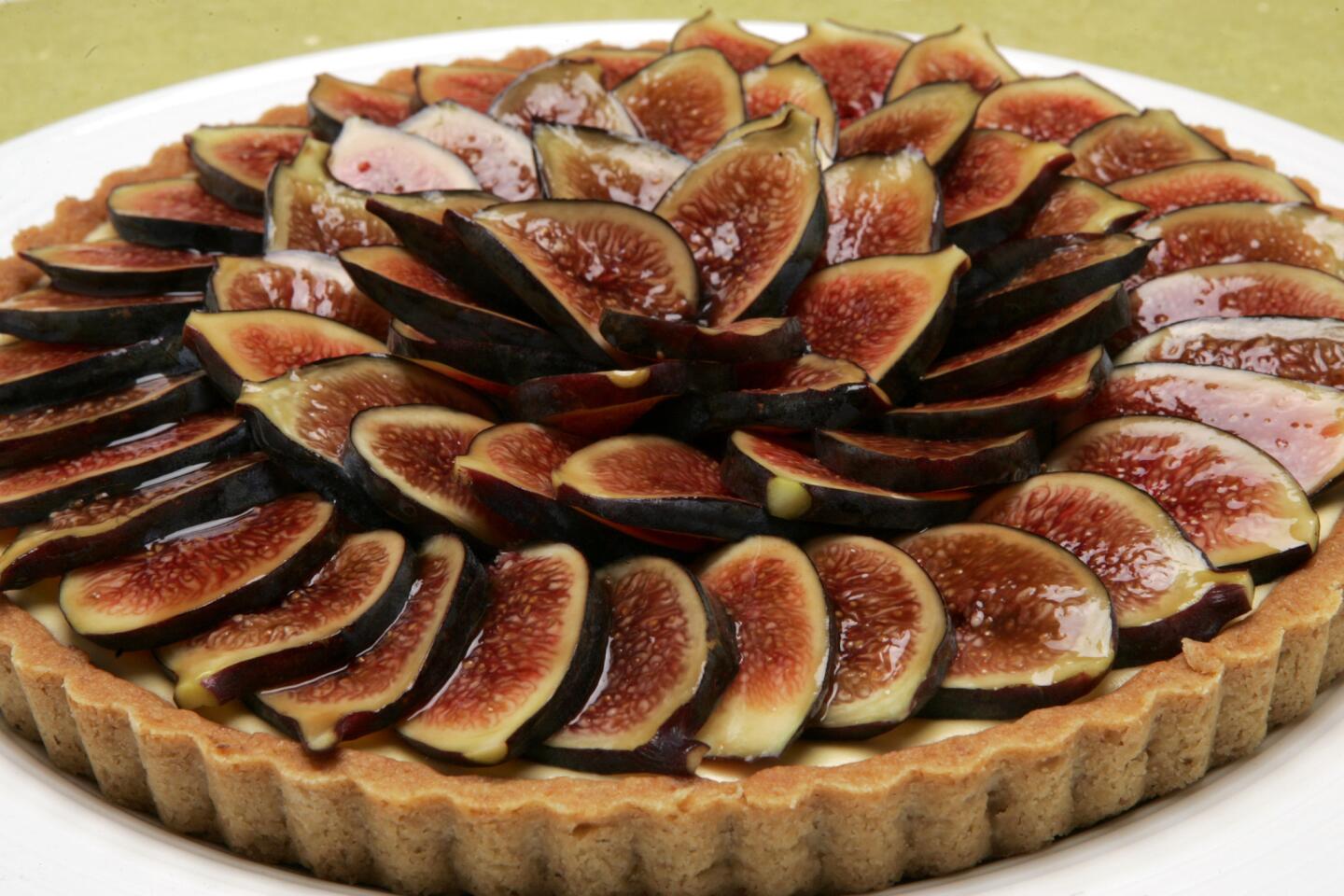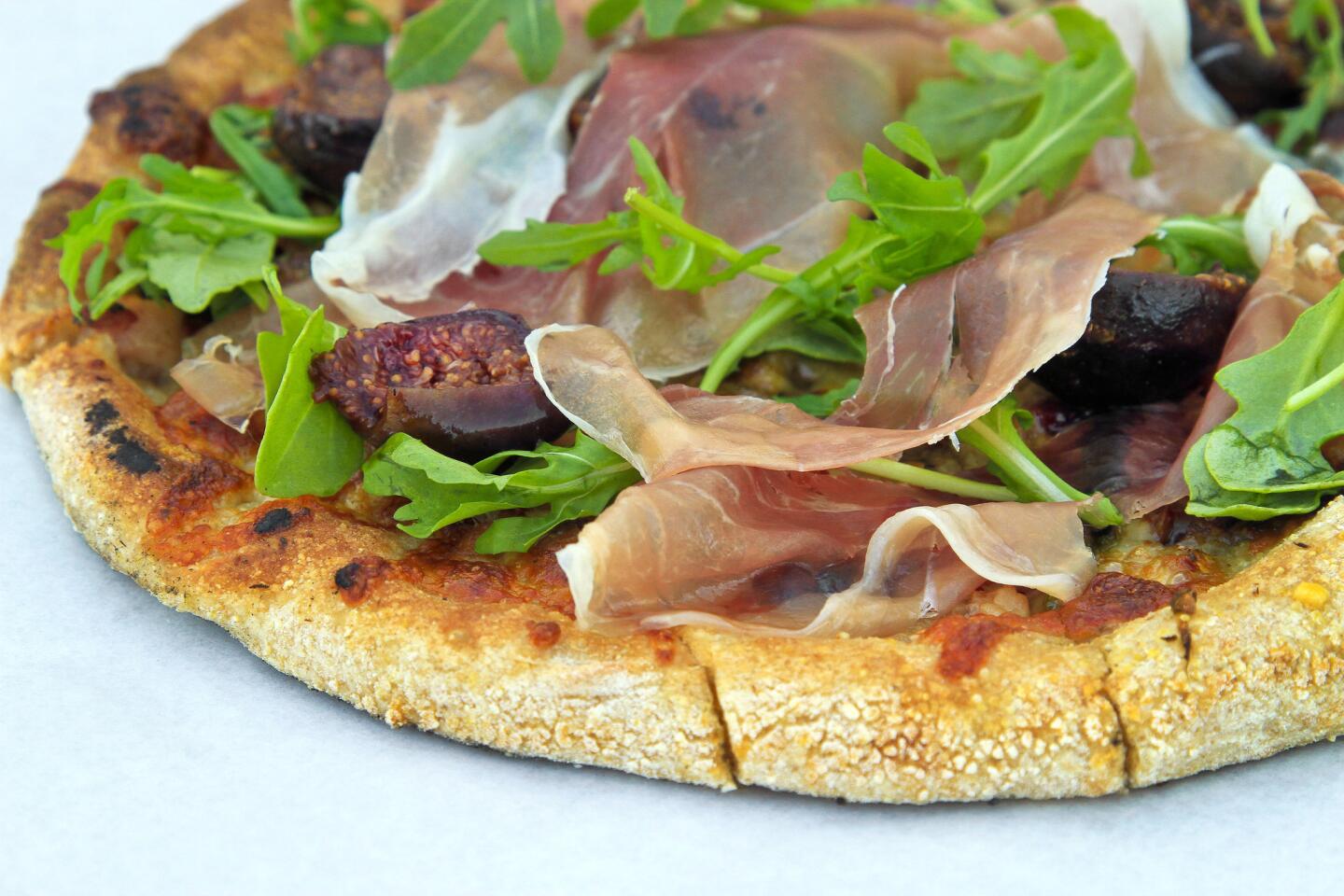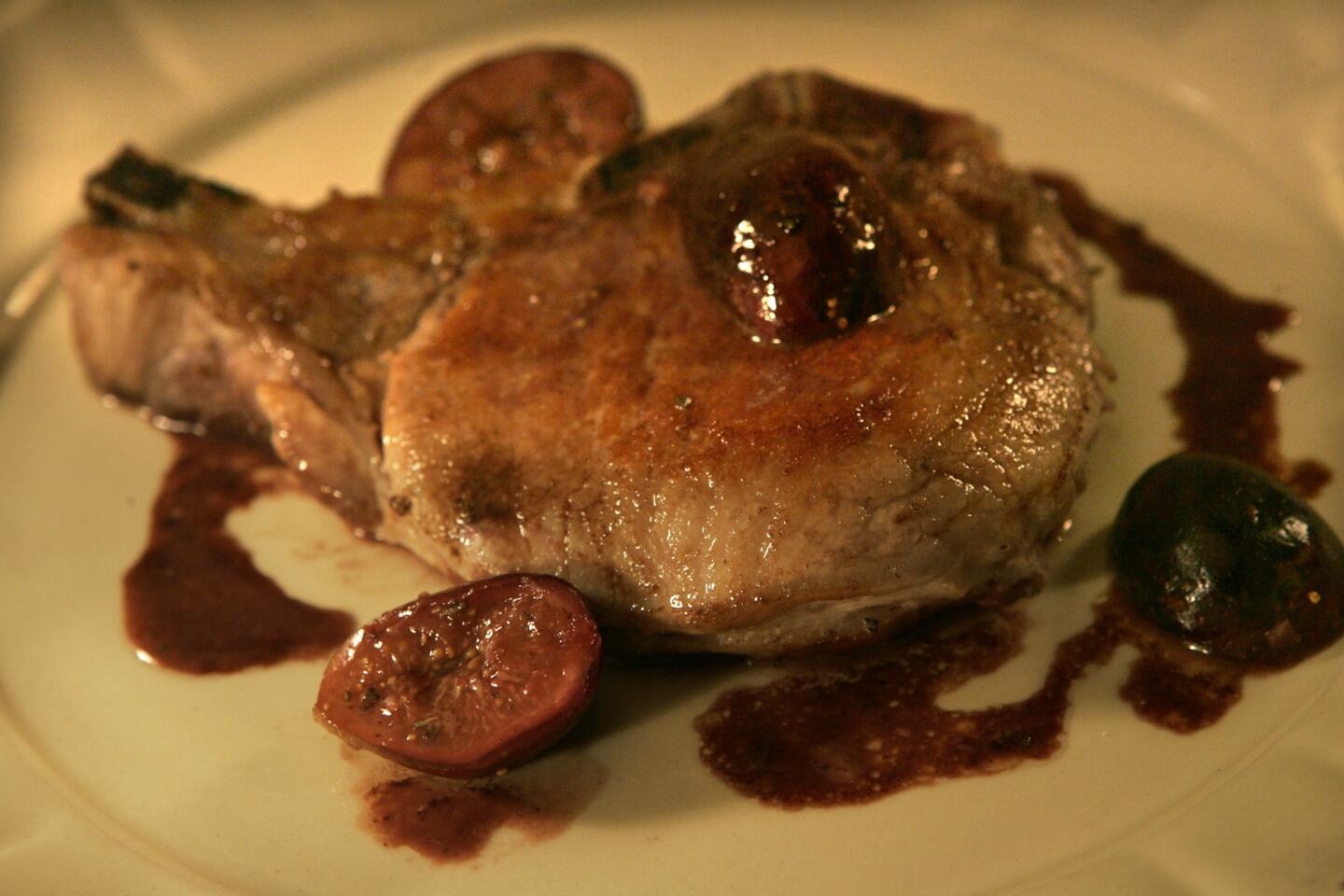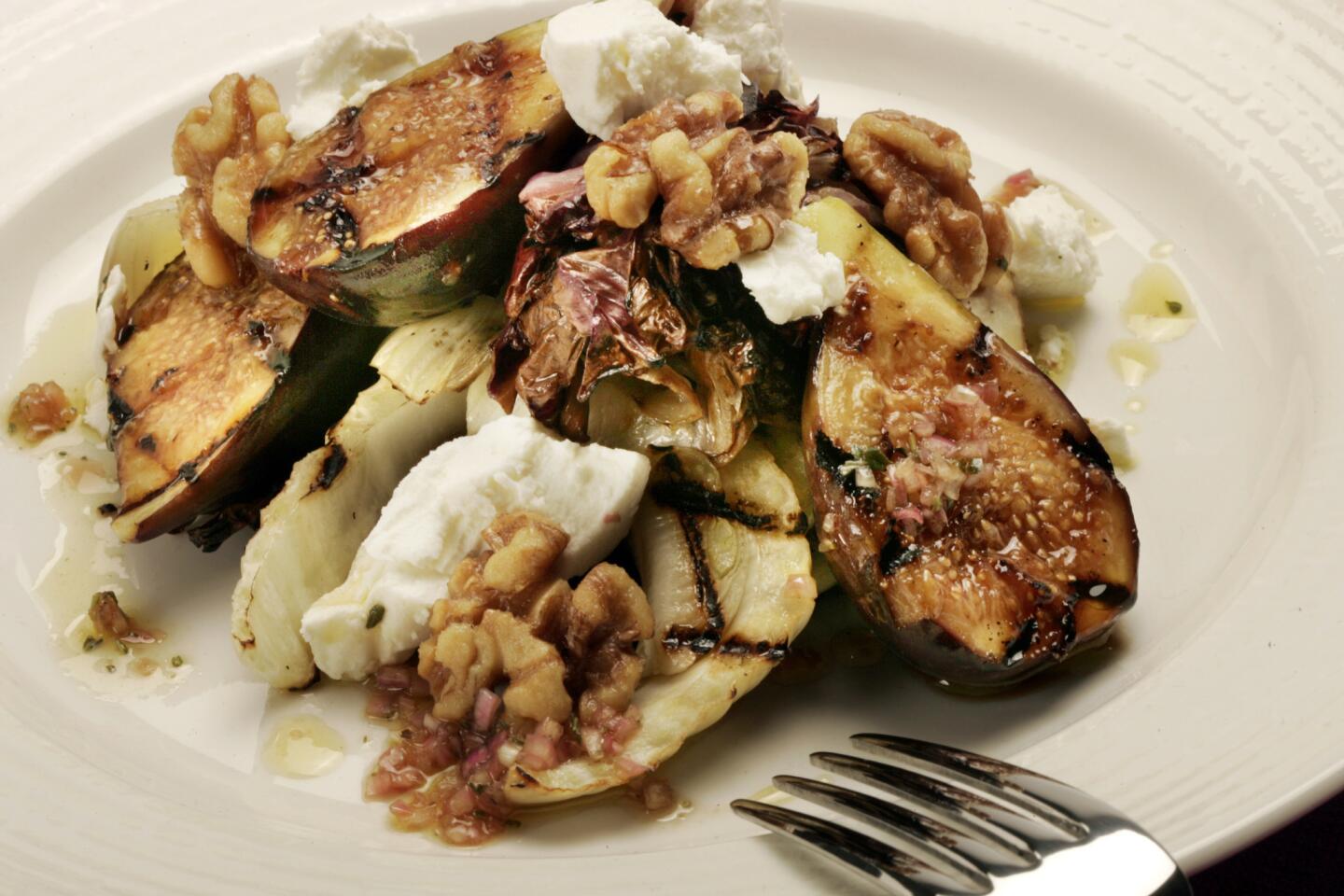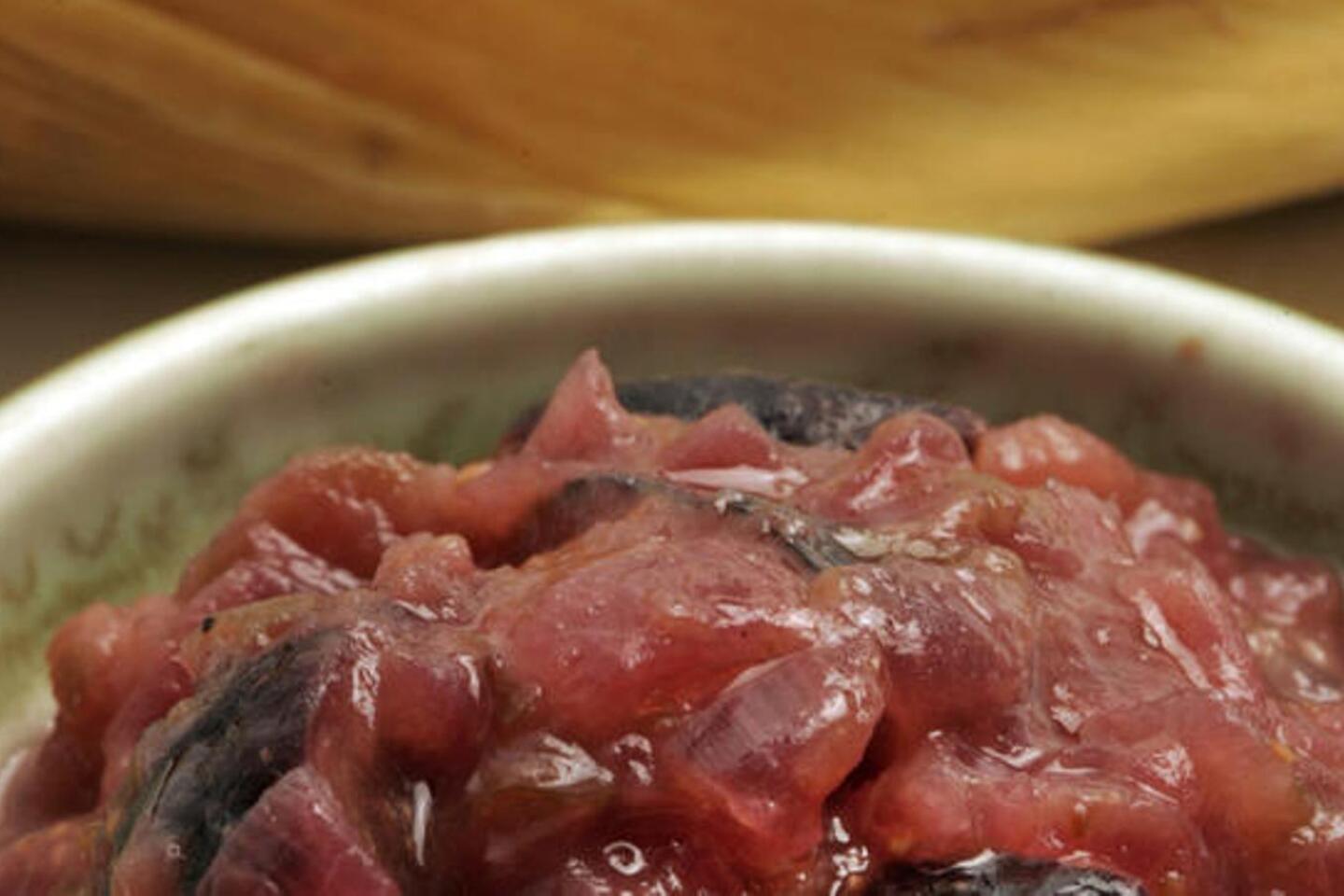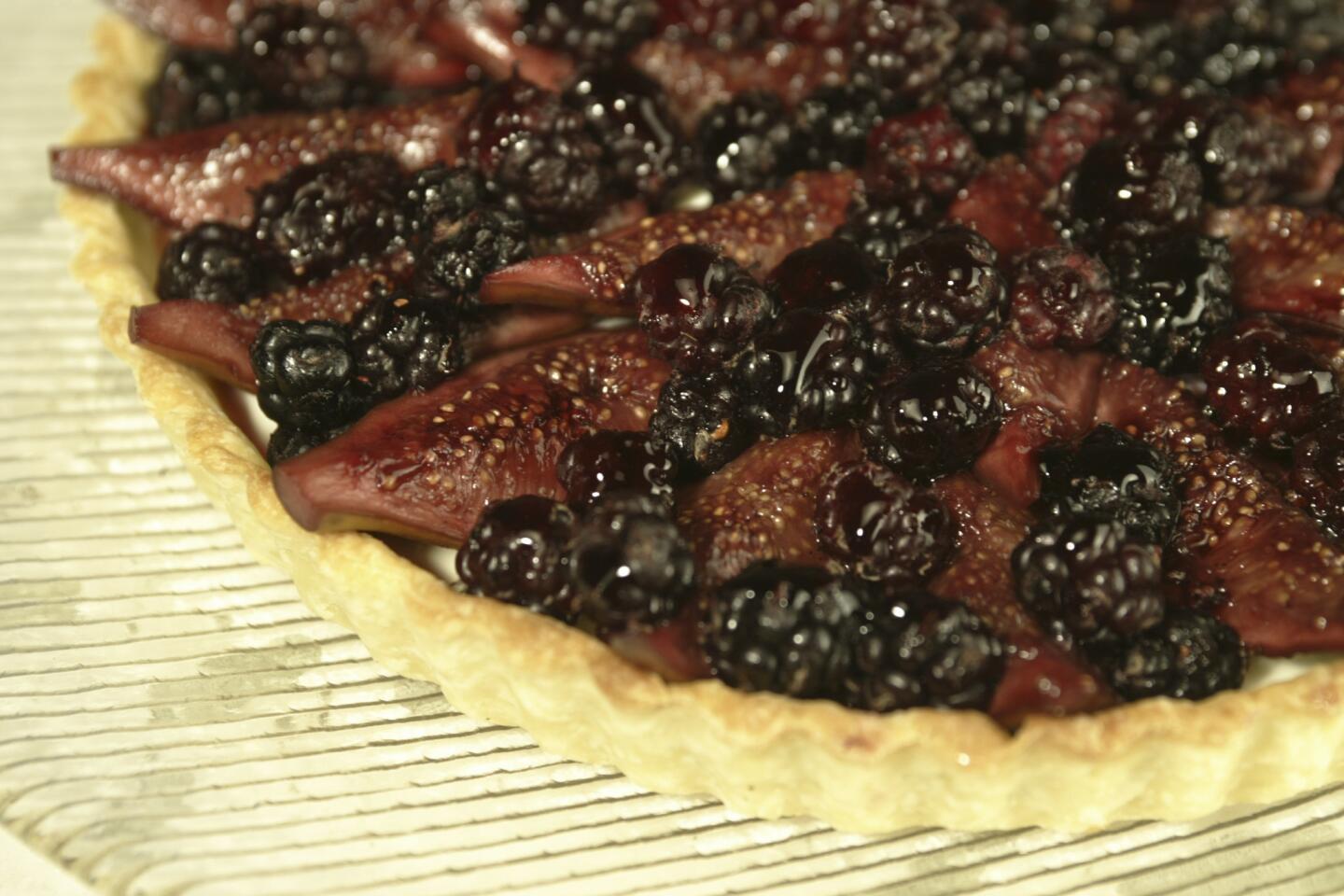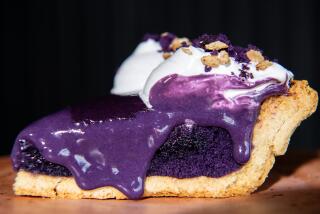Farmers market report: Figs are in season
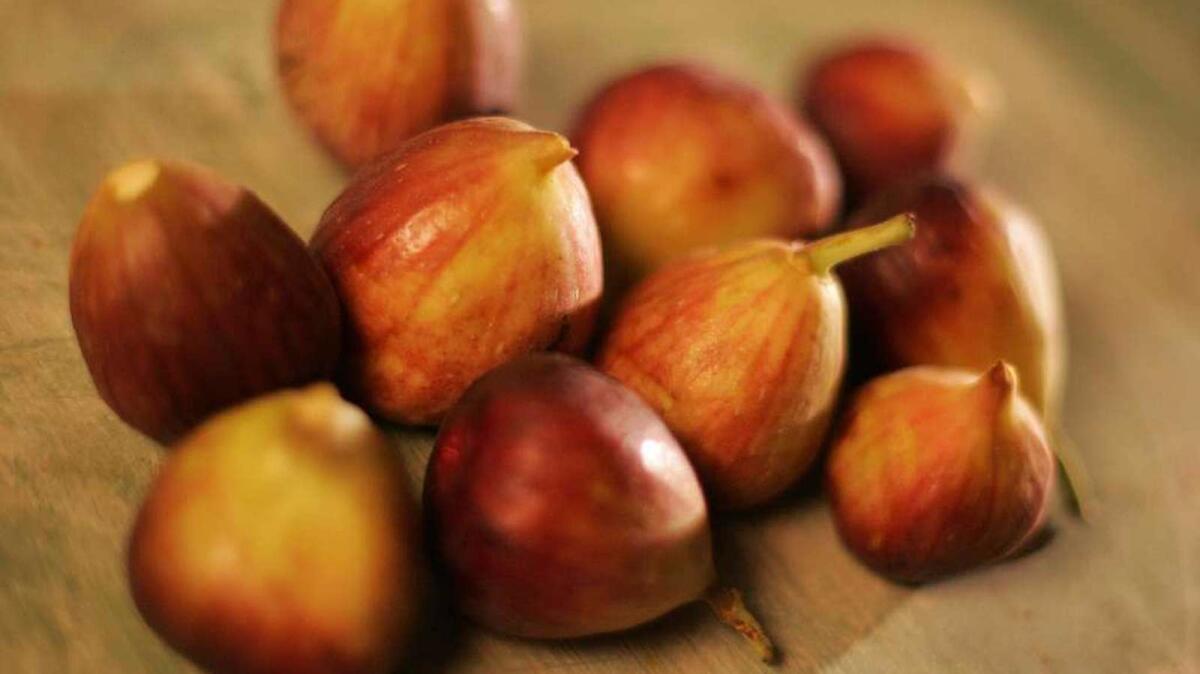
- Share via
What’s in season: The many varieties of figs can usually be divided into two classes: green and black. Here in California, black figs — including smaller Mission and larger, paler Brown Turkey — are most often eaten fresh, as they’re generally sweeter and have a more pronounced flavor. Green figs such as Adriatic and Tiger are also prized for their fresh flavor, though Kadota, the most common green fig, has a thicker skin with an often bland flavor, and is best saved for drying or canning. Fig season is short, typically running through the end of August.
What to cook: Figs are not really a fruit, but are in fact an inverted flower, the many seeds in the center giving the fig a distinctive crunch. Ripe, flavorful figs are best enjoyed fresh, eaten out of hand or sliced and added to salads or used as a garnish. Or throw them on the grill, charring fresh figs for caramelized notes and deeper flavor. Figs also work well in jams, or as a quick summer pickle. Use dried figs in quick breads and other baked goods.
What’s on the horizon: A variety of grapes are showing up at various market stands.
Click on the photo gallery below to access eight of our favorite fig recipes:
FIG TART WITH MASCARPONE CREAM
Total time: 1 hour, 10 minutes, plus chilling time | Serves 8 to 10
Note: Adapted from “The Pie and Pastry Bible” by Rose Levy Beranbaum.
SWEET NUT COOKIE TART CRUST
1/2 cup pecans
3 tablespoons sugar, preferably superfine
6 tablespoons unsalted butter, cut into 1-inch cubes
3/4 cup bleached all-purpose flour
1/8 teaspoon salt
1 egg yolk
4 teaspoons heavy cream
1. In a food processor, pulse the nuts and sugar until the nuts are finely ground. Add the butter and pulse about 15 times, until no loose particles of the nut-sugar mixture remain. Add the flour and salt and pulse again, about 10 times, or until the butter is no larger than small peas. Alternatively, finely grate the nuts and place them in a medium bowl. Add the sugar, flour and salt, stirring to combine. Cut in the cold butter using a pastry cutter or two knives until the mixture resembles coarse meal.
2. In a small bowl, stir together the yolk and cream. Add it to the mixture and pulse or mix just until incorporated, about 8 times. Knead the dough lightly, just until it holds together. Flatten it into a 6-inch disc, wrap the dough well in plastic wrap, and refrigerate for 30 minutes or freeze it for 10 minutes, until firm enough to pat into the pan or roll.
3. Remove the chilled dough from the refrigerator and lightly flour it on both sides. Place the dough between two sheets of plastic wrap and gently roll it out into a one-eighth-inch circle slightly more than 12 inches in diameter. At this point, if the dough feels too soft to place in the pan, place the dough, still between the plastic wrap, onto a cookie sheet and into the refrigerator for a few minutes to firm up.
4. Remove the top sheet of plastic wrap from the dough and use the bottom sheet to lift and invert the dough over a 10-inch-by-1-inch tart pan with a removable bottom. Evenly drape the dough into the tart pan, pressing it gently into the sides. If the plastic wrap sticks, refrigerate or freeze the dough until it is firm enough to be removed easily.
5. Trim any off the top of the sides, leaving about one-eighth-inch dough over the sides to accommodate any shrinkage during baking. Use the excess dough to patch cracks. You will probably have a little dough left over.
6. Place the tart pan in the refrigerator for at least one hour to chill the dough before baking. Heat the oven to 425 degrees.
7. Remove the chilled dough from the refrigerator and prick the bottom of the dough all over with a fork. Place the tart shell in the oven and bake for 5 minutes. After 5 minutes, reduce the heat to 375 degrees and continue to bake for 10 to 15 minutes until the bottom of the crust is golden and set and the sides are a deeper golden brown. Remove the crust from the oven and cool on a rack. The baked crust will keep at room temperature in an airtight container for up to 2 days.
MASCARPONE CREAM AND TART ASSEMBLY
3 egg yolks
4 tablespoons plus 2 teaspoons sugar, divided
1 tablespoon sweet Marsala
2/3 cup mascarpone, preferably imported, at room temperature
1/2 teaspoon powdered gelatin
1/3 cup heavy cream
3/4 teaspoon vanilla extract
1 pre-baked sweet nut cookie tart crust
4 cups fresh black figs, about 20, cut lengthwise into 1/4-inch slices
1 tablespoon good-quality balsamic vinegar
3/4 teaspoon cornstarch
1. In a heat proof bowl or the top of a double-boiler, whisk the egg yolks together with 2 tablespoons of the sugar and the Marsala. Set the bowl over a pan of simmering water, making sure the water does not touch the bottom of the upper container. Whisk constantly until the mixture nearly triples in volume and begins to thicken, 3 to 5 minutes. Be careful not to overcook the yolks or they will scramble.
2. Immediately place the bowl with the egg mixture into a larger bowl filled with ice water, and continue to whisk a couple of minutes until the mixture cools.
3. In a large bowl, whip the mascarpone over low speed until creamy, about 10 seconds. Increase the speed slightly, and gradually beat in the cooled yolk mixture until completely incorporated, scraping the sides of the bowl once or twice with a rubber spatula. Set aside.
4. Place 1 1/2 teaspoons water in a small, heat-proof measuring cup. Sprinkle the powdered gelatin over the water, allowing the gelatin to soften. Place the measuring cup in a small pan of lightly simmering water to allow the gelatin to dissolve and warm.
5. In a chilled mixing bowl, combine the heavy cream with 2 teaspoons sugar. Beat on medium speed until the cream just begins to thicken, about 2 minutes. Add the warmed gelatin and the vanilla extract and beat just until stiff peaks form when the beater is raised.
6. With a rubber spatula, fold the whipped cream mixture into the mascarpone mixture; you should have about 2 cups. Scrape the mixture into the baked tart shell, smooth the top with the spatula, and refrigerate for at least 1 hour to set.
7. Remove the chilled tart from the refrigerator. Starting at the outside edge, place the fig slices, pointed ends upward, in concentric circles on the filling, tilting the slices so they lean slightly toward the edge of the crust in a petal-like fashion.
8. In a small saucepan, combine the balsamic vinegar, 1 tablespoon water, the remaining 2 tablespoons sugar and cornstarch and stir until the sugar and starch are dissolved. Heat the mixture over medium heat, stirring constantly, until the mixture comes to a boil. Boil for 1 minute, stirring constantly so the mixture does not burn. Immediately remove from the heat and pour the glaze into a heat-proof glass measuring cup or bowl. Using a pastry brush, brush the glaze onto the figs. Refrigerate for at least 1 hour before unmolding. The completed tart will keep, refrigerated, for up to 2 days.
Each of 10 servings: 365 calories; 5 grams protein; 37 grams carbohydrates; 4 grams fiber; 24 grams fat; 12 grams saturated fat; 133 mg. cholesterol; 48 mg. sodium.
Love cooking as much as I do? Follow me @noellecarter
ALSO:
How to make an easy 30-minute albacore ceviche
Treat yourself with this brown sugar shortbread recipe
Farmers market report: Eggplant is in season. We have 9 great recipes
More to Read
Eat your way across L.A.
Get our weekly Tasting Notes newsletter for reviews, news and more.
You may occasionally receive promotional content from the Los Angeles Times.
